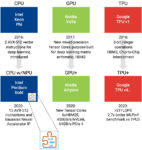AI vision processing moving to the edge is an undeniable industry trend. OpenFive, the custom silicon business unit of SiFive, discusses this trend with compelling facts in their recent paper titled “Enabling AI Vision at the Edge.” AI vision is being deployed in many applications, such as autonomous vehicles, smart cities, … Read More
Semiconductor Intellectual Property
Webinar: How to Protect Sensitive Data with Silicon Fingerprints
Data protection is on everyone’s mind these days. The news cycle seems to contain a story about hacking, intrusion or cyber-terrorism on a regular basis. The cloud, our hyperconnected devices and the growing reliance on AI-assisted hardware to manage more and more mission critical functions all around us make data protection… Read More
Using IP Interfaces to Reduce HPC Latency and Accelerate the Cloud
IDC has forecasted that over the next five years, the Global Datasphere — the amount of data that’s created, transferred over the network and stored each year — will increase by over 3X to 175 zettabytes (Figure 1). Much of this is driven by the Internet of Things (IoT), video applications (including video streaming,… Read More
Hearables: From Earbuds to Life Augmentation and Beyond
As the months of 2020 passed by, I started noticing more and more people sporting what looked like fashionable ear accessories. I’m of course referring to True Wireless Stereo (TWS) earbuds. With the rapid increase in online meetings due to social distancing requirements, it appeared that adoption of TWS earbuds was even faster… Read More
USB 3.2 Helps Deliver on Type-C Connector Performance Potential
Despite sounding like a minor enhancement version for USB, USB 3.2 introduces many important changes for the USB specification. To see where USB has come from and where it is going, it is essential to look at what is found in USB 3.2. The other salient point is that now the Type-C connector has split out from the underlying USB specification… Read More
Features of Short-Reach Interface IP Design
The emergence of advanced packaging technologies has led to the introduction of new types of data communication interfaces. There are a number of topologies that are defined by the IEEE 802.3 standard, as well as the Optical Internetworking Common Electrical I/O CEI standard. [1,2] (Many of the configurations of interest … Read More
USB4 Makes Interfacing Easy, But is Hard to Implement
USB made its big splash by unifying numerous connections into a single cable and interface. At the time there were keyboard ports, mouse ports, printer ports and many others. Over the years USB has delivered improved performance and greater functionality. However, as serial interfaces became more popular and started being used… Read More
It’s Energy vs. Power that Matters
In tiny devices, such as true wireless headphones, the battery life of the device is usually determined by the chips that execute the device’s functions. Professor Jan Rabaey of UC Berkeley, who wrote the book on low power, also coined the term “energy frugal” a number of years ago, and this term is even more valid today with the proliferation… Read More
FD-SOI Offers Refreshing Performance and Flexibility for Mobile Applications
SoC designers often have to make a, “red pill or blue pill,” decision when it comes to selecting process technology. Usually, a choice has to be made between performance, power and area, with one being prioritized at the expense of the others. However, as is pointed out in a recent paper by Mixel and NXP, designers can have the best … Read More
Podcast EP8: A Look Inside Analog IP and Analog Bits
Dan and Mike are joined by Mahesh Tirupattur, executive vice president at Analog Bits. Mahesh discussed how he found his way to analog IP design and his long association with Analog Bits. Effective strategies for analog IP design and deployment are discussed as well as leading edge applications for analog IP . Mahesh also provides… Read More










AI Bubble?